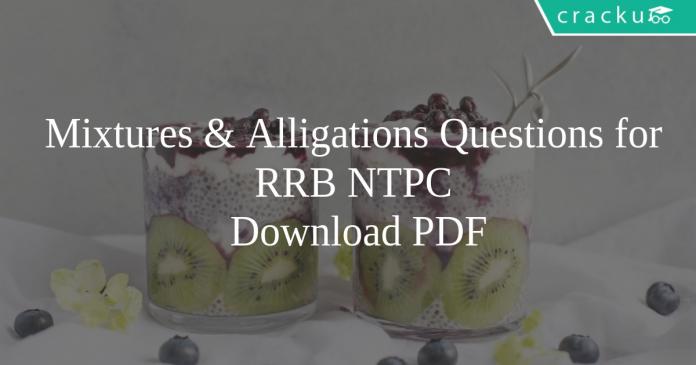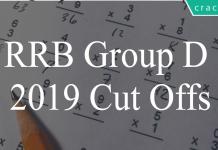Mixtures & Alligations Questions for RRB NTPC PDF
Download RRB NTPC Mixtures & Alligations Questions and Answers PDF. Top 15 RRB NTPC Mixtures & Alligations questions based on asked questions in previous exam papers very important for the Railway NTPC exam.
Download Mixtures & Alligations Questions for RRB NTPC PDF
Take a free mock test for RRB NTPC
Download RRB NTPC Previous Papers PDF
Question 1: An alloy A is made up of Zinc and Copper in the ratio 2 : 3 and an alloy B is made up of Zinc and Aluminum in the ratio 3 : 4. If another alloy C is made from 10 kg of alloy A and 14 kg of alloy B, then what is the proportion of Zinc present in alloy C?
a) 3/7
b) 5/12
c) 4/9
d) 5/7
e) none of these
Question 2: A and B are two vessels of equal volumes. A contains milk water mixture in which the ratio of milk and water is 3:1. B contains milk water mixture in the ratio 7:1. In what ratio should the contents of the two vessels be mixed so that the resultant mixture has 80% milk?
a) 2:3
b) 3:2
c) 4:3
d) 3:4
e) 5:4
Question 3: Two equal volume mixtures containing acid and water in the ratio 4:1 and 5:3 respectively are combined. What is the approximate acid percentage of the resultant solution?
a) 65%
b) 70%
c) 75%
d) 80%
e) 85%
RRB NTPC Previous Papers [Download PDF]
Question 4: Fresh grapes contain 75% water (by weight) while dry grapes contain 20 % water (by weight). Anil bought 40 kg fresh grapes and kept them in the sun. The grapes dried in one day. What is the weight of the dried grapes?
a) 15 kg
b) 10 kg
c) 18 kg
d) 12.5 kg
e) none of these
Question 5: Solution A has alcohol and water in the ratio 3:1. Solution B has water and alcohol in the ratio 2:3. In what ratio must A and B be mixed such that the ratio of alcohol and water in the resultant solution is 7:3?
a) 1:2
b) 2:1
c) 1:6
d) 6:1
e) 4:3
Question 6: A and B are mixtures of milk and water. In mixture A, the concentration of milk in the solution is 40% while in mixture B, the concentration of water in the solution is 40%. If a new mixture C is made by mixing A and B in the ratio 1:2, what is the concentration of milk in C?
a) 40%
b) 47.67%
c) 53.33%
d) 50%
e) Cannot be determined
Question 7: A 1 litre solution has milk and water in the ratio 2:3. 100 ml from this solution is replaced with pure milk. What will be the new ratio of milk and water in the solution?
a) 4:7
b) 11:18
c) 3:5
d) 21:27
e) 23:27
Question 8: In what ratio a type of rice at 8 Rs/kg should be mixed with another type of rice at 13 Rs/kg such that the mixture worth 10 Rs/kg.
a) 1:4
b) 2:7
c) 1:1
d) 3:5
e) 3:2
Question 9: Wine to milk ratio in two mixtures A and B is 2:3 and 5:1 respectively, if these mixtures are mixed in the ratio 2:1, find the ratio of milk to wine in the resultant mixture.
a) 1:4
b) 2:7
c) 1:1
d) 3:5
e) None of these
Question 10: Milk and grapes are mixed in the ratio 5:3 by weights and this mixture is dried to form a sweet. During this process grapes lost 20% of their weight and milk lost 24% of its weight. Find the proportion of grapes in the sweet thus formed.
a) 38.7%
b) 36.5%
c) 42.3%
d) 44.5%
e) 38.6%
18000+ Questions – Free SSC Study Material
Download General Science Notes PDF
Question 11: Two mixtures A, B with milk to water ratios 5:2, 3:4 respectively are mixed in equal quantities to form a mixture C. what is the ratio of milk to water in C?
a) 4:3
b) 3:2
c) 1:5
d) 2:3
e) None of these
Question 12: The ratio of milk to water in a 120 liter mixture is 7:3, how many liters of extra water to be added so that the ratio becomes 7:5.
a) 28
b) 13
c) 26
d) 24
e) 25
Question 13: In what ratio must 5% concentrated acid be mixed with 40% concentrated acid to get 25% concentrated acid?
a) 1:2
b) 2:5
c) 4:3
d) 3:4
e) Cannot be determined
Question 14: In what ratio should a milkman mix water and milk such that he earns a profit of 25% by selling the milk at the cost price? (water is free)
a) 4:1
b) 1:4
c) 3:1
d) 1:3
e) 1:5
Question 15: A dealer mixed 1.5 litres of Rs 50/litre petrol with 2.5 litres of Rs. 40/ litre petrol. What is the rate of the new mixture?
a) Rs. 43.75 per litre
b) Rs. 44.75 per litre
c) Rs. 45.75 per litre
d) Rs. 46.75 per litre
e) None of the above
Daily Free RRB Online Tests for RRB Exams
Answers & Solutions:
1) Answer (B)
The amount of Zinc present in 10kg of Alloy A = 2/5 of 10 = 4kg
The amount of Zinc present in 14kg of Alloy B = 3/7 of 14 = 6kg
Thus, total amount of Zinc present in 24 kg Alloy C = 6 + 4 = 10 kg
Thus, the proportion if Zinc present in Alloy C = 10/24 = 5/12
2) Answer (B)
The percentage concentration of milk in the first vessel is 75% and the percentage concentration of milk in the second vessel is 87.5%. The desired quantity of milk is 80%.
Let’s say a litres of mixture A and b litres of mixture B gives the desired quantity. Then,
75a + 87.5b = 80(a+b)
=> 7.5b = 5a
=> a/b = 3/2
Hence the ratio in which the contents of A and B should be mixed to get the desired result is 3:2.
3) Answer (B)
Let the volumes of each of the original solutions be 80 ml each.
1st solution -> 64 ml acid and 16 ml water
2nd solution -> 50 ml acid and 30 ml water
The combined solution will have 114 ml acid and 46 ml water.
Acid % = $\frac{114}{160}\times100\approx70$%
4) Answer (D)
40 kg of fresh grapes will have 75% water so the amount of pulp would be 25%.
Hence the amount of pulp in the grapes that Anil bought = .25*40 = 10 kg
We know that 80% of dry grapes contain pulp.
If the weight of dry grapes is ‘x’, then 0.8x = 10kg
Hence x = 10/0.8 = 12.5kg
Now dried grapes consist of 80% pulp. Hence the total weight of the dried grapes would be 10/.8 = 12.5 kg.
5) Answer (B)
Using alligation formula, we get
Hence, the required ratio is 2:1
Alternative solution:
Let the quantity of A be m and the quantity of B be n.
Given, the resultant mixture has alcohol to water ratio of 7 : 3, which implies alcohol to solution ratio of 7 : 10.
$\frac{\frac{3m}{4}+ \frac{3n}{5}}{m + n} = \frac{7}{10}$
14m + 14n = 15m + 12n
m : n = 2 : 1
RRB Group-D Previous Papers (Download PDF)
6) Answer (C)
Let us assume that mixture C is created by mixing 100 units of A with 200 units of B.
=> Total volume of C=300 units.
Milk in 100 units of A = 40 units.
Milk in 200 units of B = 120 units [40% is the water concentration in B => 60% is the concentration of milk in B]
Total milk in C = 160 units.
=> Concentration = (160/300) X 100
7) Answer (E)
Milk to water ratio is 2:3 initially.
Volume of milk = 400 ml and volume of water = 600 ml in the solution.
Now 100 ml is removed.
This means 40 ml of milk and 60 ml of water is removed.
Now 100 ml of milk is added.
New volume of milk = 400-40+100 = 460 ml.
New volume of water = 600-60 = 540 ml.
Ratio = 460:540 = 23:27.
8) Answer (E)
Let the quantities mixed be $x, y.$
Based on the given information, the following equation could be derived.
$\frac{8x+13y}{x+y} = 10$ ==> $3y = 2x$
==> $x:y = 3 :2$
Since there is no such option, the correct option to choose is E.
9) Answer (E)
Let the total volume of the resultant mixture = V.
==> Volume of mixture A = 2V/3
==> Volume of wine mixed through mixture A = (2/5)*(2v/3) =4v/15
Similarly volume of wine mixed through the mixture B = (5/6)*(V/3) = 5v/18.
==> Total volume of wine in that mixture = 49v/ 90
==> Volume of milk in the mixture = (V – 49V/90) = 41v/90
Ratio of milk to wine = 41:49.
Since there is no such option, the correct option to choose is E.
10) Answer (A)
Let the weight of mixture formed before drying =x
==> Weight of milk before drying = 5x/8, weight after drying = 0.76*5x/8 = 3.8x/8
Weight of grapes before drying = 3x/8, weight after drying = 0.8*3x/8 = 2.4x/8
==> Percentage of grapes in the sweet formed = (2.4/6.2)*100 = 38.7%
11) Answer (A)
Let the volume of each mixture =x
==> Total amount of milk in the mixture = (5x/7 + 3x/7) =8x/7
==> total amount of water in the mixture = 2x – 8x/7= 6x/7
==> milk to water ratio = 4:3
So the correct option to choose is A.
12) Answer (D)
Number of liters of milk in the initial mixture = (120/10)*7 = 84
Number of liters of water = (120/10)*3 = 36
Let x be the amount of water that should be added.
==> 84/(36+x) = 7/5 ==> 84*5 = (36+x)*7 ==> x = 24.
So the correct option to choose is D.
13) Answer (D)
We use the alligation method
5%——40%
—\——/—
—–25%—-
—/——\—
15——-20-
The ratio is 15:20 or 3:4.
14) Answer (B)
Let’s say 100 ml of milk is worth 100 rupees. So if the milkman wants to get 25% profit after selling a thing for 100, then its cost price should be 100/1.25 = 80
Hence he should only sell 80 ml milk and should add 20ml water.
Hence the required ratio of water and milk is 1:4
15) Answer (A)
The total cost of petrol in the mixture of 4 litres = 1.5 * 50 + 2.5 * 40 = 75 + 100 = Rs. 175
So, the rate per litre = 175/4 = 43.75
Take a free RRB NTPC mock test
DOWNLOAD APP FOR RRB FREE MOCKS
We hope this Mixtures & Alligations Questions for RRB NTPC Exam will be highly useful for your Preparation.






